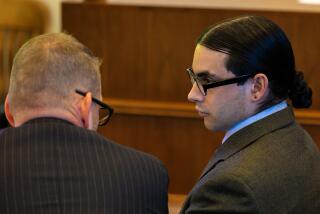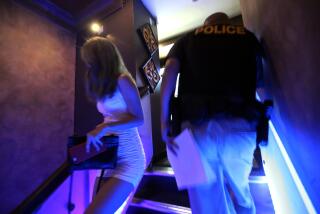South Korea Uses Rewards to Encourage Good Deeds
- Share via
SEOUL, South Korea — When a deranged man with three samurai swords commandeered a city bus and took two hostages, taxi driver Chae Kwang-suk didn’t hesitate.
He caught up with the speeding bus and swerved his cab in front in an effort to force it to stop.
Zigzagging through a mile of Seoul traffic, Chae screamed warnings to pedestrians to get out of the way as the bus rammed his taxi four times before it finally came to a halt and the hostage-taker was captured.
“I was afraid a little,” Chae said. “But I knew I just had to do it or people would be hurt.”
It’s that spirit of civic responsibility and self-sacrifice that the South Korean government is trying to promote with rewards for heroic deeds.
The Health-Welfare Ministry pays about 35 million won, or $45,000, to the family of eui saja, a good Samaritan killed during a heroic act. For eui sang ja, someone who is hurt helping another, rewards range up to half that amount, depending on the seriousness of the injury.
The ministry has proposed raising the maximum payment to 100 million won, or about $125,000, after a highly publicized case in September in which a man was stabbed to death while stopping a would-be rapist.
“We need to remember these honorable deeds,” said Cho Sung-kyun, assistant director of the ministry office that makes the payments. “They don’t do this for the money, but it is still too small.”
The idea of rewarding model citizens is not new in South Korea.
In the 19th century, authorities erected an ornately painted red wooden gateway in front of the house or in the village of a woman who embodied the Confucian values of reverence and loyalty to her husband’s parents.
In modern Korea, much of that close-knit village life has faded. Millions have moved to the impersonal cities to be a part of the nation’s rapid economic development. More than a quarter of Korea’s 44 million people live in the capital, Seoul.
The hero compensation is partly aimed at overcoming the reluctance of people who might think it is too much trouble to get involved in the problems of others.
It also is meant to make sure heroes do not suffer too great an economic hardship because of their good deeds.
After the bus incident last December, Chae spent four months in the hospital and three months at home recuperating from back injuries suffered when the bus crashed into his taxi.
He received $16,000 from the government program and a $1,200 reward from the transportation ministry. He also got a $1,200 gift from the brother of the man who commandeered the bus. The hijacker was sent to a mental institution.
Chae returned to work in July, but says pain keeps him from sitting as long as before. That has forced him to cut his driving time to eight hours a day from the 14 he used to work.
“Whenever I feel the pain, I have a little regret,” he said. “But at that moment, I had to do what I had to do. And I think other people would have done the same.”
More to Read
Sign up for Essential California
The most important California stories and recommendations in your inbox every morning.
You may occasionally receive promotional content from the Los Angeles Times.










